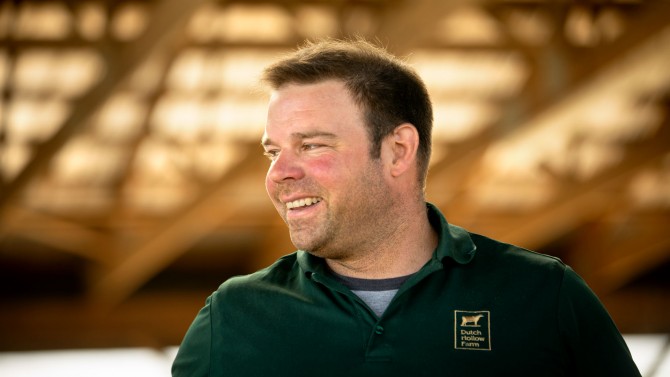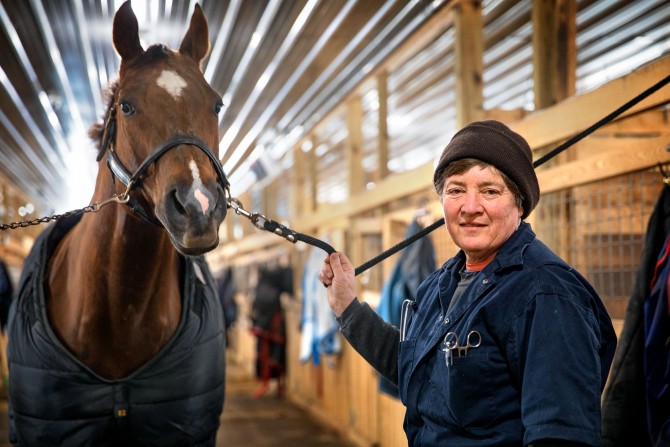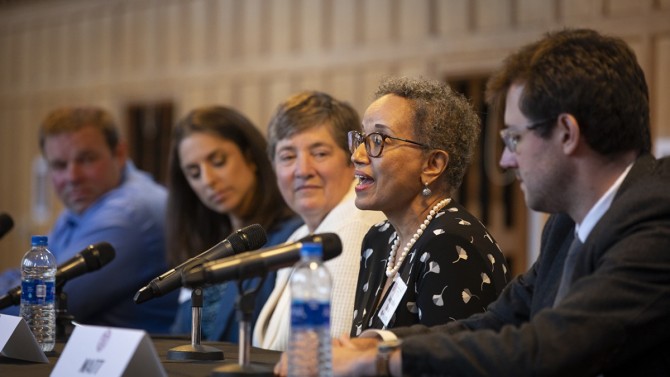Award honors Cornellians who return home to make impact
By Joe Wilensky
Now in its second year, the Cornell New York State Hometown Alumni Award program honors alumni throughout the state who all made a similar choice.
From a leading dairy farmer in Columbia County to a legendary Cornell Cooperative Extension leader in New York City, from a passionate director of the Saint Regis Mohawk Tribe in the northernmost reaches of the state to a devoted veterinarian in Chemung County, the first seven recipients are alumni who returned to their home communities to make an impact.
The award program, launched by Cornell’s Division of University Relations in collaboration with Alumni Affairs and Development, recognizes New York state alumni who have returned to their home counties to start or enhance a business or nonprofit, and who regularly volunteer and are deeply engaged in their communities.
Cornell University Relations staff travels to each hometown to host a reception and award presentation for family, co-workers, friends, and local and state government representatives. Mentors and colleagues speak, often movingly, about the impact the awardee has made in the community and in the lives of others. Cornell donates $1,000 in each awardee’s name to an agency or charitable organization of their choice.
The first seven recipients of the award were:
Nate Chittenden ’00 (College of Agriculture and Life Sciences), a third-generation dairy farmer who co-manages Dutch Hollow Farm in Columbia County with his brothers and parents, and is a local 4-H dairy leader;
Christa Glazier ’01 (CALS), vice president of communications and marketing for the Syracuse-based CenterState Corporation for Economic Opportunity, who previously worked in the district office of U.S. Rep. Jim Walsh, R-25th Dist., on environmental and immigration-related issues;
Tsiorasa Barreiro ’00 (CALS), an Akwesasne native and executive director for tribal operations of the Saint Regis Mohawk Tribe, who previously worked for Cornell’s American Indian Program (now the American Indian and Indigenous Studies Program);
Matthew Nagowski ’05 (ILR School), a group vice president at M&T Bank who also teaches statistical programming at Buffalo State College and is a board member and former chair of Buffalo’s Partnership for the Public Good;
Barbara Mix, DVM ’82 (College of Veterinary Medicine), a veterinarian at the Chemung County Veterinary Clinic who also runs her own large-animal practice, has developed a local animal science program curriculum, and volunteers to foster and rehabilitate dogs;
Jacqueline Davis-Manigaulte ’72 (College of Human Ecology), director of community relations and the family and youth development program leader for Cornell Cooperative Extension in New York City, where she has developed and enhanced programs that impact New York City residents for more than 45 years; and
E. Hartley Bonisteel Schweitzer ’09 (College of Architecture, Art and Planning), a community planner for the Development Authority of the North Country in Watertown.
‘The quintessential Cornell trait’
At a special recognition ceremony during Homecoming Weekend, the first six recipients and their families gathered for a lunch, panel discussion and Q&A with university leaders, faculty, trustees and current students.
At the event, Cornell President Martha E. Pollack said the award initiative is both unique and “just so consistent with who we are at Cornell. We want to recognize these wonderful alumni who have gone back to their communities and are having a positive impact there.”
“We talk about impact – this is the model that we should all be trying to follow,” said Joel Malina, vice president for university relations. “Giving back when and where possible for the common good. It’s the quintessential Cornell trait, and it’s embodied here in these six individuals.”
During the event’s panel discussion, hosted by Gary Stewart, associate vice president for community relations, the awardees shared their stories and described how their Cornell educations prepared them for excellence in their fields and instilled in them the importance and value of community service.
Mix described how much of her inspiration and passion in her veterinary work and teaching is rooted in wanting to pay forward the mentorship she received from local teachers and veterinarians, when she was a teen and from her Cornell professors.
“I found out that I really like to teach,” she said. “I try to encourage [students] … I cheer from the background and push them forward.”
Barreiro grew up around Cornell – his father worked in the university’s American Indian Program for almost two decades. “It really formed my appreciation for many of the issues going on in New York state tribes,” he said, describing how that program fostered “the ‘full circle’ concept – native students, coming from our home reservations, and working at and being educated at Cornell, getting skilled and bringing those skills back full circle to our communities.”
Davis-Manigaulte said her aim was always to return to her home community, New York City, after graduation. “I came here [to Cornell],” she said, “to learn as much as I could [to] help me fully be able to help people rise to their fullest potential.”
Last year, the award program itself received an honor of its own: a judge’s citation for excellence in a government or community relations campaign from the SUNY Council for University Advancement (SUNYCUAD) as part of the group’s 2019 Awards for Excellence.
“This wonderful initiative wouldn’t be possible without the support of colleagues throughout the university, and alumni throughout New York state,” Stewart said. “It says so much about Cornell’s hometown spirit, talent and heart.”
This story originally appeared in the online-only spring 2020 issue of Ezra magazine.
Media Contact
Get Cornell news delivered right to your inbox.
Subscribe




